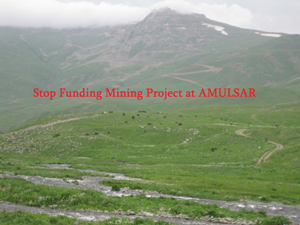To: Thomas Lubeck, IFC Regional Manager for the South Caucasus.
Dear Mr. Thomas Lubeck,
Thank you for responding to our letter regarding the Amulsar mining project in Armenia. We would like to give you our input as stakeholders in the project.
In responding to the letter sent to you by The Greens Union of Armenia, you stated: “IFC supports the development of private sector activities that help create jobs and contribute to the growth of Armenia’s economy. As part of that effort, we are seeking ways to foster a sustainable mining sector in Armenia.”
In particular, regarding the mining at Amulsar mountain, you’re implying that “the scarce water resources” will be protected in spite of the mining operations there.
In reality, your statements do not hold.
First of all, the concept of sustainable mining is unfounded, since the mineral resource itself is non-renewable after it gets extracted out of the earth, while mining jobs are temporary, and, at the same time, the sustainable farming jobs, which have existed for thousands of years, are disappearing, as mining replaces agriculture. On the other hand, the damage to the environment caused by mining operations and its waste is perpetual, even after the mining stops.
It’s no news that IFC finances private mining companies with off-shore accounts. It seems to be a common practice among the banks known to us here, in Armenia. The policy of the banks has become clear for us living in Armenia – deprive the government of the opportunity to manage its own economy, and in particular, to exploit its own mineral resources, while creating favorable conditions for private, especially foreign, companies to seize the public (common) property for over-exploitation.
All of that seizure of public property is being accomplished legally, according to legislation imported, promoted and adopted with the help of grants from the World Bank and other international organizations. It seems that many in the banking sphere are motivated in destroying the living space of the local population and thus abetting the exodus of the Armenian people from its native lands.
In Armenia, the past eight years have witnessed a proliferation of mining companies grabbing any opportunity for exploration and mining of metals. In reality, most of these “mines” are not real mines but small outcroppings. Yet, because mining companies are not penalized (charged fees) for dumping their large volume of toxic wastes into the environment, even the exploitation of these mineral outcroppings (where the metal concentration per ton of rock is very low) has become profitable for them. By the way, there are many other banks, (for example, Unicredit, BNP, Rand Merchant Bank, ING, Raiffeissen, Societe General, Natixis, Nedbank, Standard Bank, Citibank), interested in funding the exploitation of the mineral resources at Amulsar mountain.
Upon the analysis of the situation at Amulsar, we can state that the only winner will be the mining company, Lydian International Ltd., while the communities in Armenia will bear terrible and irreplaceable losses.
Let us present a few facts about the benefits and costs of possible mining at Amulsar.
Estimates of the mineral content at Amulsar’s Tigranes site are as follows:
45 ton of gold, 180 ton of silver, together worth about 2.5 billion dollars, at current prices, also many rare metals, all together worth about 500 million dollars, thus the mining company will generate about 3 billion dollars of revenue. (Note that the rock contains many different metals besides gold and silver, all of which will be wasted: Arsenic 575 ton, Beryllium 34 ton, Bismuth 50 ton, Cadmium 38 ton, Gallium 296 ton, Chromium 288 ton, Cobalt 467 ton, Copper 2629 ton, Iron 1.5 million ton, Nickel 333 ton, Lead 781 ton, Scandium 358 ton, Antimony 441 ton, Strontium 11795 ton, Titanium 9295 ton, Vanadium 4156 ton, Zinc 14196 ton, Mercury 70 ton, Uranium 195 ton).
Let’s estimate the dumping fees which Lydian International Ltd. avoids paying because of baseless pro-mining legislation:
- After using heap-leach technology of extraction, large exposed heaps of over 56 million tons of pulverized rock processed with a cyanide solution (a 1st class waste) are left abandoned, for which the company should be required to pay 6.72 billion dollars to the government.(This is just for one mining site –Tigranes – at Amulsar.)
For dumping of 222 million tons of “empty” rock, which contains many heavy metals at low concentrations, a 3rd class waste, into the environment, the government should be paid 2.66 billion dollars.
- According to the mining plan presented by Lydian International Ltd., the operation at Tigranes site will occupy about 400 hectares, including the open-pit mine at Tigranes site, which itself will occupy 80 hectares. As mining expands to other sites of the mountain, the area occupied by mining operations will swallow up more land. Thus, hundreds and hundreds of hectares of land will become forever poisoned, useless for agriculture, perpetual sources of toxicity for the surrounding environment, large pits filled with poisonous water. Yet the company does not pay the government for the loss of pastures, springs and streams, which were there on the slopes of the mountain before the mining, before the carving of the mountain into deep open-pits.
- Let’s list the losses and damages that the mining operation will impose upon the population and the land outside of its immediate mining sites: all the surrounding agricultural land, pastures, rivers (Vorotan, Darb, Arpa), streams, springs, water reservoirs (Spandarian, even Lake Sevan), groundwater, will be contaminated from mining dust, explosions, from huge heaps of mine tailings, transportation activity, landslides, seismic jolts, etc. A local hydrogeological expert has warned that the explosions at the mine will alter the regional hydrology to the extent that the nearby resort town of Jermuk may lose the quality and the flow-volume of its mineral waters, and that many springs around the mine will dry up. Also, as pastures disappear, the capacity to produce cheese also disappears.
To summarize, for Tigranes site, while the company’s revenue will be around 3 billion dollars, the dumping fee just for the two classes of generated waste is calculated to be over 9 billion dollars. At the same time, the life-support system of the population and of the country is being torn down by mining, causing food scarcity, socio-economic insecurity and regional destabilization.
We are hoping that IFC will change its funding policy toward mining projects and abstain from interfering into the economic management of sovereign countries.
Dr. Hakob Sanasaryan
President, The Greens Union of Armenia
June 30, 2014
Electronic contact: armgreen@rambler.ru







